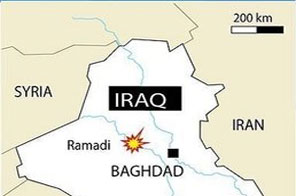Triple attacks kill 19 in Iraq
RAMADI: Twin car bombs near government buildings and an apparently co-ordinated suicide attack at a hospital killed 19 people and wounded 80 in western Iraq Sunday, shattering a relative lull in violence.
The two car bombs exploded in quick succession in Ramadi, the capital of Anbar province, near the offices of the provincial governor while a meeting was in progress, a police official said.
"The attacks killed 19 people, including nine police," an interior ministry official told AFP. "Eighty-one other people are wounded and 30 cars are completely burned."
The official said 80 percent of the wounded were police, and 10 percent of the injured were in critical condition.
An AFP journalist in the building said the first bomb went off at around 12.30 pm (0930 GMT) about 20 metres (yards) from the building in a civilian parking lot, speeding the arrival of firemen and police.
A second car bomb then exploded, the journalist said, leading the police to seal off the area, which was littered with body parts.
Shortly afterwards at Ramadi General Hospital, where victims had been rushed for treatment, a suicide bomber killed at least two people and wounded four others.
The meeting in the government offices was between provincial officials, including directors for services such as health care and water, and tribal leaders.
Provincial governor Qasim Mohammed Abid said in an interview with Al-Jazeera television that the attack had not been directed against the government buildings but was near a garage for civilian cars.
"The attack took place 500 metres (yards) from my office. It was a crime against civilians. It was at a ... normal garage for cars of the people," Abid said.
Iraqi police and soldiers dramatically increased their presence on Ramadi's streets in the aftermath of the attacks, and security forces also imposed a curfew, blocking any cars from entering or exiting the city.
Anbar police, meanwhile, announced that they would offer 10 million Iraqi dinars (8,700 dollars) for any information related to those behind the blasts.
The attacks are the latest sign that unrest in Iraq's biggest province of Anbar, once a bastion of the Sunni Arab insurgency that has since become more peaceful, is on the rise.
Ramadi was a key insurgent base in the aftermath of the US-led invasion in 2003.
Anbar became the theatre of a brutal war focused on the cities of Fallujah and Ramadi, while several towns along the Euphrates river valley became insurgent strongholds and later safe havens for fighters.
But since 2006, local Sunni tribes there have sided with the US military. Daily violence has dropped dramatically in Anbar as Al-Qaeda fighters have been ejected from the region.
This month, however, the level of violence has increased.
Last week, a car bomb outside a Sunni mosque southwest of Fallujah around the time of evening prayers killed seven people and wounded 29.
And a day earlier, a suicide bombing at a funeral in Haditha, one of several towns along the Euphrates valley that also became Al-Qaeda strongholds after the invasion, killed five people.
Violent deaths in Iraq dropped by more than half in September compared to the previous month, official figures showed last week, with 203 people killed across the country.
September's death toll was the lowest since May, when a total of 155 people were killed.






